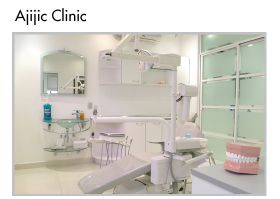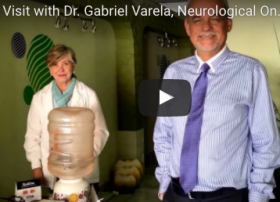How's the medical and dental tourism in Mexico?
Sandi Vandiver
 Medical and dental tourism in Mexico is on the upswing. They’re working very hard. There are a number of hospitals scattered all over Mexico for medical tourism. Mazatlan (where I live) has one of them, and I’m sure Puerto Vallarta, Cabo San Lucas, Cancun, Guadalajara, and other places have it.
Medical and dental tourism in Mexico is on the upswing. They’re working very hard. There are a number of hospitals scattered all over Mexico for medical tourism. Mazatlan (where I live) has one of them, and I’m sure Puerto Vallarta, Cabo San Lucas, Cancun, Guadalajara, and other places have it.Establishing a medical tourism industry is very difficult to do, it takes years. They are working to get a certain designation that, in order to qualify, the...
 Medical and dental tourism in Mexico is on the upswing. They’re working very hard. There are a number of hospitals scattered all over Mexico for medical tourism. Mazatlan (where I live) has one of them, and I’m sure Puerto Vallarta, Cabo San Lucas, Cancun, Guadalajara, and other places have it.
Medical and dental tourism in Mexico is on the upswing. They’re working very hard. There are a number of hospitals scattered all over Mexico for medical tourism. Mazatlan (where I live) has one of them, and I’m sure Puerto Vallarta, Cabo San Lucas, Cancun, Guadalajara, and other places have it.Establishing a medical tourism industry is very difficult to do, it takes years. They are working to get a certain designation that, in order to qualify, the hospital has to pass inspection, and they look at all the credentials of the doctors, the food, and other things. It’s like if you want to start a school, you would have to get the proper licensing and some state agency would come and check your place and make sure that it was properly outfitted to have children. And once they can get all that done, the hope is, that there are people in Washington working diligently to finally allow those of American retirees to use our Medicare here in Mexico. It hasn’t happened yet but one day, it may.
There are companies in the US now that have finally figured out that they can literally ship their patients for a hip replacement or knee replacement, something other than a dire emergency, to here in Mexico, Thailand, or India to have the surgery. A hip replacement here in Mexico right now would probably cost you about $12,000, which would include a week in the hospital, instead of maybe the three days they would allow in the US, your aftercare, the whole thing. What would that hip replacement cost you in the US? Perhaps a hundred thousand dollars?
The healthcare here is pretty good. Here’s a perfect example. A little over a year ago, I thought I was having something wrong with one of my eyes, and I just happen to live next door at that time to an office building that had nice English- speaking ophthalmologist. I went to him and he said, “I think you got a tear in your in retina so I want you to go see the retinologist.”
The retinologist said, “Actually you have a tear in both of your retinas and we need to do laser surgery.” I waited and saw a retinologist in Albuquerque, New Mexico, who said, “Nope. No tear. No holes in your retina. You’re fine. You have macular degeneration but you don’t have a tear in your retina.” And so, there are some things I would try but others I would not.
Alternatively, just a few weeks ago I decided to have a little face work done, and the whole thing cost me 40,000 pesos, which at that time with the rate of exchange was about $2,500. I couldn’t have come close to that in the US. And this particular doctor here is very well known in the US and other parts of the world. She’s very good.
(Sandi Vandiver at home in Mexico, pictured.)
Posted October 2, 2015
Andre Bellon - Bellon Insurance Agents
 Patients from the United States, Canada, or Europe often come to Mexico just to get medical and dental procedures done here. The dental services in Mexico could cost 20% of what they would cost in the United States. For example, a big dental procedure may cost US $1,000 in the United States, but in Mexico, it’s going to cost you not more than 3,000 pesos, which is equivalent to US $150.
Patients from the United States, Canada, or Europe often come to Mexico just to get medical and dental procedures done here. The dental services in Mexico could cost 20% of what they would cost in the United States. For example, a big dental procedure may cost US $1,000 in the United States, but in Mexico, it’s going to cost you not more than 3,000 pesos, which is equivalent to US $150. That means if you had a $1,000 procedure, you would save...
 Patients from the United States, Canada, or Europe often come to Mexico just to get medical and dental procedures done here. The dental services in Mexico could cost 20% of what they would cost in the United States. For example, a big dental procedure may cost US $1,000 in the United States, but in Mexico, it’s going to cost you not more than 3,000 pesos, which is equivalent to US $150.
Patients from the United States, Canada, or Europe often come to Mexico just to get medical and dental procedures done here. The dental services in Mexico could cost 20% of what they would cost in the United States. For example, a big dental procedure may cost US $1,000 in the United States, but in Mexico, it’s going to cost you not more than 3,000 pesos, which is equivalent to US $150. That means if you had a $1,000 procedure, you would save yourself $850. If you have a $10,000 procedure, which is not unusual in the United States for complicated dental work, and it cost you $1,500 here in Mexico, which means that you may save yourself $8,500. That’s a lot of money, which is enough to pay for your trip, for being in Mexico, and maybe for some shopping.
(Hector Haro dental clinic, Ajijic, Mexico, pictured.)
Posted November 11, 2016
Bruce Fraser
 Quality-wise, medical and dental tourism in Chapala and Ajijic is good. It's not as well developed as it could be and it probably will be in the future. But as more and more Canadians find out about hip replacement and knee replacement surgeries and the fact that you can get it done within a month or so if you come down here in Mexico, I'm sure they're going to take advantage of that. And as Medicare evolves in the US and gets big backlogs and starts moving toward that same kind...
Quality-wise, medical and dental tourism in Chapala and Ajijic is good. It's not as well developed as it could be and it probably will be in the future. But as more and more Canadians find out about hip replacement and knee replacement surgeries and the fact that you can get it done within a month or so if you come down here in Mexico, I'm sure they're going to take advantage of that. And as Medicare evolves in the US and gets big backlogs and starts moving toward that same kind... Quality-wise, medical and dental tourism in Chapala and Ajijic is good. It's not as well developed as it could be and it probably will be in the future. But as more and more Canadians find out about hip replacement and knee replacement surgeries and the fact that you can get it done within a month or so if you come down here in Mexico, I'm sure they're going to take advantage of that. And as Medicare evolves in the US and gets big backlogs and starts moving toward that same kind of situation that they have in Canada where you wait three to four years before you get a hip or knee replacement surgery, Americans will take advantage, too. Right now, with the exchange rate the way it is, it's almost criminal not to take advantage of it.
Quality-wise, medical and dental tourism in Chapala and Ajijic is good. It's not as well developed as it could be and it probably will be in the future. But as more and more Canadians find out about hip replacement and knee replacement surgeries and the fact that you can get it done within a month or so if you come down here in Mexico, I'm sure they're going to take advantage of that. And as Medicare evolves in the US and gets big backlogs and starts moving toward that same kind of situation that they have in Canada where you wait three to four years before you get a hip or knee replacement surgery, Americans will take advantage, too. Right now, with the exchange rate the way it is, it's almost criminal not to take advantage of it. Obviously, you don't want to come down to Mexico and have doctors you don't know and trust botch an operation. But given due diligence, I think the potential is there for medical tourism. Having a doctor botch an operation is just one of those things you try to minimize by finding out in advance the answers to questions such as Who is this guy? What references does he have? Do they speak English? When he explains the procedure to me, will I understand what he's talking about? Does he have an assistant who speaks good English so I can make sure I can ask my questions?
I find that foreigners tend to trust Mexicans who speak English, which is not the right criterion in many cases, such as when choosing a doctor. Just because the doctor or a dentist who may have been educated in the US speaks pretty good English, it doesn't necessarily mean they're good. That's not the right thing to look at. It's more important to find out if they've done the procedure. Did it go well? What after effects did they have? This is more important than finding out if he can explain a procedure to you in advance in theory, but then not translate the theory into practice.
We can expect the same kind of medical outcomes in Mexico relative to the US or Canada. The processes are generally better in Mexico. People always rave about the quality of hospitals in Mexico and the fact that they get a private room. I don't think I've ever heard, in 15 years being down here, anybody saying they were in a semi-private room. You pay a lot less to get things done, you get treated better, and the outcomes are pretty much on par.
(Click on the picture or here for a YouTube with a visit to a numerological surgeon in the Lake Chapala area.)
Posted May 5, 2017



.png)